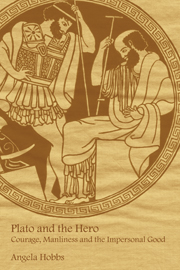Book contents
- Frontmatter
- Contents
- Acknowledgements
- Preface
- Glossary
- 1 The puzzle of Plato's thumos
- 2 Thumos, andreia and the ethics of flourishing
- 3 Arms and the man: andreia in the Laches
- 4 Odd virtue out: courage and goodness in the Protagoras
- 5 Why should I be good? Callicles, Thrasymachus and the egoist challenge
- 6 Heroes and role models: the Apology, Hippias Major and Hippias Minor
- 7 The threat of Achilles
- 8 Plato's response: the valuable as one
- 9 Alcibiades' revenge: thumos in the Symposium
- Epilogue: The weaver's art: andreia in the Politicus and Laws
- Bibliography
- Index
6 - Heroes and role models: the Apology, Hippias Major and Hippias Minor
Published online by Cambridge University Press: 01 October 2009
- Frontmatter
- Contents
- Acknowledgements
- Preface
- Glossary
- 1 The puzzle of Plato's thumos
- 2 Thumos, andreia and the ethics of flourishing
- 3 Arms and the man: andreia in the Laches
- 4 Odd virtue out: courage and goodness in the Protagoras
- 5 Why should I be good? Callicles, Thrasymachus and the egoist challenge
- 6 Heroes and role models: the Apology, Hippias Major and Hippias Minor
- 7 The threat of Achilles
- 8 Plato's response: the valuable as one
- 9 Alcibiades' revenge: thumos in the Symposium
- Epilogue: The weaver's art: andreia in the Politicus and Laws
- Bibliography
- Index
Summary
HOMERIC ROLE MODELS AND ALEXANDER THE GREAT
We have seen how the Gorgias raises questions concerning the respective appeal of Socrates and Callicles, or the Calliclean superman, for the young men of fourth-century Athens: Plato is well aware that if he wishes to establish Socrates as a new ideal, then he has competition on his hands. Yet the most widely influential role models were neither the ruthless political operators promoted by some of the sophists, nor the sophists themselves; they were, still, the heroes and warrior-kings of the ancient myths and legends, and above all they were those heroes as depicted in Homer. There is abundant evidence that immersion in the Homeric poems formed the major part of a Greek male's education: both Xenophanes and Plato himself, for example, refer to Homer as the teacher of Greece, and in Xenophon's Symposium a certain Niceratus recounts how his father, wishing him to become ‘a good man’, made him learn the entire Homeric corpus; even now, he says, he can still recite the Iliad and Odyssey by heart. Nor was the point of such close study simply to cultivate one's aesthetic sensibilities: the poems were commonly regarded as repositories of ethical and perhaps even technical wisdom, practical manuals for a gentleman's life. We have already seen Callicles make use of Homer in precisely this way at Gorgias 485d, criticizing Socrates for not frequenting those public arenas where, in the words of Iliad 9.441, men ‘are made pre-eminent’.
- Type
- Chapter
- Information
- Plato and the HeroCourage, Manliness and the Impersonal Good, pp. 175 - 198Publisher: Cambridge University PressPrint publication year: 2000



